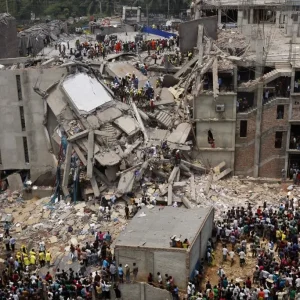

COP26 Glasgow climate protest
Introduction
You may be asking what the heck is (tr)ashion! No worries it has nothing to do with wearing bin bag trousers nor weird runaway styles you will never see on your way to a club. However, there are many controversial messages out there when talking about fashion and sustainability like a sort of unrealistic marriage story no one would bet a dime on. So, where does manipulation end, and where does sustainability start? What is sustainable when talking about fashion? Have you been greenwashed your entire life or is there a concrete solution? What should I wear?
My realisation
Long story short, my answer? I HAVE NO CLUE! Not the conclusion you were looking for I bet? But wait, bear with me a second and I’ll explain myself. I am Paolo Casula and I’ve been spending my past year running my #FashTech (Fashion Technology) #startup Shopperbird with the intent to #upcycle #clothes from #waste and #deadstock #fabrics. I have talked with 13,960 Italian tailors, 246 Italian manufacturers and suppliers, and roughly 8244 Fashion designers worldwide. Yes, that’s a lot of talking! That’s right, and what’s the catch I got from all of this? There is no such thing as “slow” nor “sustainable” fashion nowadays.
This industry, like many others (Farming, dairy, egg for example), wants you oblivious of the #PROCESS. What a tedious word right? PROCESS. Hence, very powerful when dissected and explored. TLDR, ready-to-wear business models, and mass-produced industries are everything but “sustainable” or “slow”. Fashion can’t be sustainable within the current unsustainable system. But hey, the ship already left the dock, and a substantial effort to change business models to established fast fashion brands is a ridiculous idea. However, we should start pouring more #investments into green start-ups focused on #wastemanagement .
So… what should I wear?
As I learn a bit more about this shady industry, I realise it’s not all fresh roses but more an untouched dusty spider web in a broken wardrobe with a glamorous and shiny oak polishing. So why don’t you take a couple of minutes from your Netflix to dig a bit deeper into the matter with me? On average we spend £200-£300 a month for clothes we DO NOT need but we subconsciously want to fill a gap in our wardrobe or in our insecurities. Whatever it is, you do not need that many clothes! Owning more clothes makes your life harder. I started #shopping #ondemand just one year ago and I managed to cut my expenses by £1,600 per year all owning less and better quality clothes plus I have got more time and cash to spend on my family.
There must be a reason why #veganism is a #lifestyle not a #trend like the fashion industry wants us to believe. Trends change, lifestyle stays consistent throughout your lifetime and THAT doesn’t sound good for business. What you eat, what you drive, and what you wear do leave a carbon footprint, and not looking at the PROCESS of what we buy into is irresponsible and will leave future generations in a worse condition than the current one. #climatechange is on the lips of everyone, such a hot topic right? The reality is that people who are making a difference do not have a voice on the discussion board so climate change remains just a topic of discussion and not a matter of action. We can’t change climate change unless we start with what we, as individuals, can change now and what is in our control OUR BEHAVIOUR AS CONSUMERS.
Where is the fashion industry heading to?
By 2025 the fashion industry market will be worth $3tr. #fastfashion accounts for nearly 80% of the market share but it accounts for just $36 billion (15%) of the global market revenues. Scary thought considering it causes 3% of global #co2 emissions mainly due to burning waste and consequently causing #airpollution and #waterpollution impacting entire #ecosystems. At the current rate, demand is not any close to decreasing and as the population increases, we will see fast fashion thriving. Fast fashion is not going away any time soon instead new fast fashion brands are popping up like mushrooms to fill in the ever-growing demand.
On the bright side, the recent tragic events we have faced from #covid19pandemic in early 2020; the #warinukraine in early 2022 and a #globaleconomy in crisis and #recession are awakening a dormant vegan fashion community motivated to recycle and upcycle clothes. The movement affected many industries: furniture; interior design, construction materials, consumer goods, and many consumables are tackling their impact with #greentech and innovative designs. #creativity is gaining more momentum over quantity. #scarcity is becoming the new valuable as we see with #nft and unique art pieces. In a conformed society we are seeing the anti-conformists breaking the silence and owning back the pleasure of being different.
Conclusion
What the market values is the ability to produce things that are rare and irreplaceable. What the market dismisses are activities that are easy to replicate and produce a small amount of value.
If you still didn’t fall asleep here is my take that may help you if you are motivated, value-driven and have some self-discipline:
- Try going vegetarian (22-day challenge) and try shifting to a vegan diet later on. However it goes you can still retreat to a vegetarian diet. You’ll be surprised to see how much you’ll save, the health benefits and the cooking skills you’ll gain!
- Try to use public transport as much as you can, bike in cities or take that beloved and refreshing walk once in a while. Avoid owning a car, even EV until fully understanding the impact of the PROCESS of its creation.
- Try recycling your food waste, make your own compost and grow some vegetables in your garden/balcony. Get your stomach 80% full to avoid waste and speed up digestion. Sort out your plastic, glass, and paper properly.
- Shop less, buy upcycled designer clothes 2/4 per year. Reuse, fix, and donate to others as much as possible. Explore second-hand, vintage, rental, thrifted, or just DIY.
Just following these tips you can do your little part in changing climate change. Every change requires sacrifice and every sacrifice sooner or later shows its results.
“Everyone thinks of changing the world, but no one thinks of changing himself/herself/himself”



